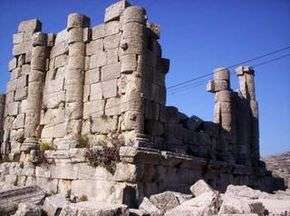Hosn Suleiman
Coordinates: 34°55′52.64″N 36°14′43.08″E / 34.9312889°N 36.2453000°E
| حصن سليمان | |
 Hosn Suleiman temple | |
 Shown within Syria | |
| Location | Syria |
|---|---|
| Region | Tartus Governorate |
| Coordinates | 34°55′53″N 36°14′43″E / 34.931289°N 36.2453°E |
Hosn Suleiman (Arabic حصن سليمان), a Syrian village, is found on the slope of the Alnabi Alsaleh mountain at an altitude 950 m, at a distance of 20 km from Duraykish and 56 km from Tartous.
History
Hosn Suleiman was a Zeus temple (Arabic: بيت سيسي) and it is hinted from the naming that it bears semitic roots derived from Zeus's name. Also known as Baal (Bel) temple, ascribed to god Baal. Still there is village nearby called Betalous (Arabic: بتعلوس). Baal was called also Baalous, and a Roman emperor existed as Elagabalus, who fought to let Rome admit the worship of Baal.[1]
The location was in close relation with Arwad kingdom (Arados) in the times of Phoenicians, and was a source of wood for ship industry. It was an important site during Hellenic and Roman periods. Syria was then part of Seleucid Empire.
The current naming is derived from King Solomon (Ar: سليمان). Now visitors can see the huge stones of the temple, with inscriptions in Greek and Latin.
References
| Wikimedia Commons has media related to Hosn Suleiman. |